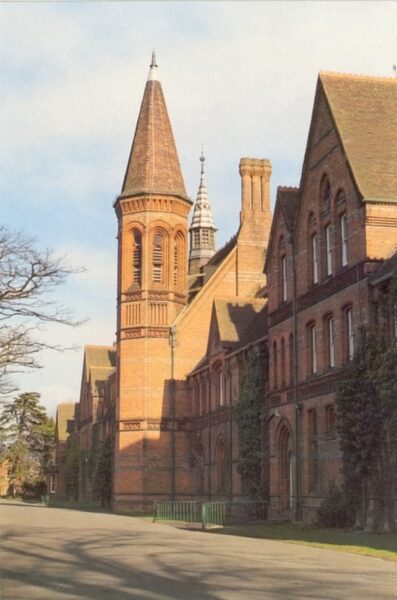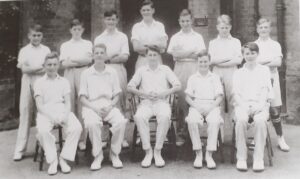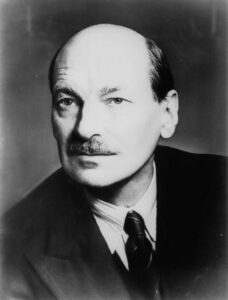One morning in early summer in 1945 a large heavy brown envelope was pushed through the letter box at 9 Elm Lodge Avenue in Reading, Berkshire. Post must have been early in those days because I can still remember going downstairs to collect it and then taking it upstairs to my mother who was still in bed. She opened the envelope to reveal a number of pages, the first of which informed her that I, Peter Barrie Knott, had been awarded a place at Reading School from September next. Furthermore, because of my age (I would not be eleven years of age until December) my place would be in the Junior School (now the Music School) and I would pass into the Senior School in September 1946.

At this time my father had not yet been demobilised from the R.A.F where he was a Gunner. He did not in fact return home until later that summer. It was up to my mother to organise all the necessary procedures and preparations prior to entering Reading Junior School in late September. Here an explanation is needed: perhaps to emphasise its exclusiveness (and/or superiority?) Reading School not only had a different holiday pattern to ordinary state schools but also a different working week, though on further reflection the fact that the school had 150 or so boarders had something to do with it. Its immediate, and long term, effect was to emphasise how different my life was to be compared to my friends and peers in my locality who would be at other secondary schools.
One of the most obvious and dramatic changes to my life would be the wearing of a school uniform. In the documents my mother received were precise instructions of what I should wear and what equipment would need to be obtained before I started school in September. Almost all of these clothes could only be purchased from certain shops. There was, if I remember correctly, one particular men’s outfitters where some clothing could be obtained at a slightly cheaper price, although as I was to learn on my first day at school the quality was easily discernible from that which had been purchased from the more exclusive department stores of which there were two in the town centre. As well as the basic uniform which was grey trousers (short) and grey jacket, there were specific socks, shoes (black), shirts (grey), and a school tie and cap. In the summer I would need a blazer (blue and white stripes) – this was probably the most expensive item. And then there was sport. In the winter rugby shorts, rugby shirt – reversible (house colours on one side and school colours on the other). Also football boots and socks and a heavy white sweater. In the summer I would need white cricket shorts and shirts. Added to this were plimsolls -black for P.E. and white for cricket. Also shorts for P. E. and a singlet (vest).
After all these requirements were those for the classroom: a pencil case and a fountain pen (the ballpoint pen had not yet been invented), a ruler and a leather satchel. On entering the senior school, I would also need an apron for craft (wood or metal work).
I am in no doubt that if my parents had not received financial grants in the form of clothing vouchers redeemable against school uniform they would not have had the financial resources to send me to Reading School.
As we lived more than three miles from school I was given a free bus pass. Fortunately, the trolley bus route passed along the main east-west road at the bottom of my street, dropping me off about half a mile from the school, all in all about half an hour journey. This meant I could just get home for dinner (lunch) and get back to school within the one and half hours between morning and afternoon school.
The shape of my working week, as well as the term and holiday structure, would alsobe very different from that of my friends who would be going on to the local secondary schools. To start with, although the school day was about the same, 9 am to 4 pm, the additional travelling time meant that from autumn to spring I would seldom come across my friends. Another major difference was that on Saturdays there was school from 9 am until 1 pm and then when I progressed into the third year of Senior School there was a games afternoon on Saturday. This meant that from that time I was effectively on a six-day week. All this had repercussions on the holiday pattern: half-terms gave us just a Saturday off school, but the long holidays were considerably extended, in the summer by as much as two weeks. The eventual effect of all these differences was to distance me from my previous friends. The only other boy who attended Reading School lived next door but one from me, he was a year older than me and had previously gone to a Catholic primary school. He also had a brother a few years older who was at the school. He did do me the kindness of accompanying me to school for my first few days.
All these circumstances in my first year at the school resulted in a fairly isolated life. Starting in the Junior School where the entry was generally fee paying (there can’t have been more than half a dozen scholarship boys in the entire school) I found I was a fairly rare specimen. Every boy apart from me had done Latin for two years. This subject was large in the curriculum. There was one similarity with the state junior school I had left in the summer. Our form teacher taught us nearly every subject, the only exceptions being games and music. I cannot remember doing either P.E. or art. I was very fortunate in that this gentleman was both a good teacher and a very kind man.
I can still remember a few of my classroom experiences. After registration and assembly our first task on returning to the classroom was handwriting practice. This consisted of copying a line of joined-up cursive writing five times, then to another different line and repeating the process. This we did continuously until the book was completed, then we handed it in and were issued with another to start the process again. Our instrument was a metal nibbed pen which we dipped into an inkwell sunk into the top of the desk. The rest of the morning consisted of Maths, English and Latin. The afternoon sessions I cannot now remember. Once a week in the afternoon we had a music lesson from a visiting master. It was in the first of these lessons that something happened that was to affect most of the rest of my life. At the start of the very first lesson each boy was required to sing some chords played on the piano. After each effort the master gave a grade – A, B or C. When it came to my turn I was awarded not A, B or a C but Z. This caused much laughter and ribaldry which I am afraid the Master, a somewhat elderly man ‘milked ‘ for some considerable time. And I was never allowed to forget it, mostly by never being included in any activities in the Music lessons, or by some jeering reference or other. This had the effect that for the next fifty years or so I was convinced that I could not nor ever would be able to sing, but I also believed that I could not enjoy or appreciate music in any of its many forms. It wasn’t until I was in my sixties that I could join in a song and allowed myself to enjoy many forms of music.
I had two further very traumatic experiences whilst I was at Reading Junior School. These both involved the Headmaster (Charles Kemp, Headmaster from 1939-1966) who was very tall and his presence in the school was all pervading. The first of these instances involved a boy who had been at my state junior school with me but was now in the other top year class. I remember that it had become known that he had been caned (beaten) by a teacher for cheating. This was no couple of strokes on the hand but a number of full blooded strokes on the backside. I remember it being a sunny morning in the summer. The punishment had been administered either before or during break. After break the top year had cricket supervised by the same teacher. I have a vivid memory of this still weeping boy sitting on the Headmaster’s knee and being consoled by him. A day or so later we had swimming and a number of us saw the boy’s bare bottom. The bruising was horrific, his buttocks were covered in deep coloured green, blue and purple bruises.
There was another occasion when a similar incident occurred. In the immediate few months following the end of World War 2 a number of children from war ravaged Europe were brought over to England to spend some recuperative time with English families. It so happened we had two Dutch boys in our class. They spoke no English and nobody in the school spoke any Dutch. On this particular morning by using sign language and drawings my form teacher had discovered the positions the boys played at football. As I was in the school football team I was instructed to take the boys with this information to the Headmaster. As we arrived at his study door we heard his angry voice shouting ‘keep still boy’. This was followed by the swish of the cane and an anguished scream. I cannot imagine what the boys, who I believe were both younger than myself, thought. I decided we should all beat a hasty retreat. When we returned to the classroom I informed my teacher that the Headmaster was engaged. I later learned what the boy was being punished for – he was a rather fat boy whom I gathered was often ridiculed in games lessons. On that morning he had told the Headmaster that his football boots were being repaired which it was discovered was a lie. Although I did not know him I did know he was two years below me and certainly was not yet nine years old.
 It was fortunate that I had a certain innate ability at sport and this enabled me to be selected for the school football team (this was soccer not rugby which we had to play in the upper school). Later in the summer I was also in the cricket team.
It was fortunate that I had a certain innate ability at sport and this enabled me to be selected for the school football team (this was soccer not rugby which we had to play in the upper school). Later in the summer I was also in the cricket team.
In a particular match against another school I found myself catching or fielding every ball that came within yards of me, everything seemed to stick to my fingers. The following day in morning assembly my performance was extolled by the Headmaster who informed the school that good fielding was every bit as important as bowling or batting. Consequently, I was awarded my school colours for cricket. It was probably the proudest moment of my first year at Reading School.

During this first year my father was demobilised from the R.A.F. My changed home circumstances affected the way I saw my life and the people around me. I became very conscious of the class differences that then existed in England and I also developed a limited political awareness. In July the first ever majority Labour Government took power [led by Clement Attlee]. I soon felt the antipathy that the middle and upper classes had for this situation. My first experience of this came within days of my arrival, when a boy came up to me in the playground and told me it was my fault that we no longer buy our own school books but instead they were issued and we would never know who had had them before. This was said with such antagonism and disdain that I was taken aback by his aggression.
Although we all wore the same school uniform it was obvious by the difference in quality of the material which of us came from the poorest homes. It soon became obvious as I grew to know the other boys better that my home and social background was very different from theirs. I also had at that time a distinctive Reading accent, although within two or three years I had almost lost it. I was also very conscious that living in a small terrace house was very different to being brought up in a spacious semi-detached house in suburbia. As my father’s job was now as a bus-conductor and was not very well paid, we had to let two of our rooms to lodgers. This situation lasted until I left school and started work.
Like most young boys I was very conscious of differences that set me apart from my fellow pupils. Socially I recognised that my parents were very different from those of other boys. My father’s job was quite low on the social scale. He also wore the uniform of a bus conductor. I remember very clearly an occasion when I was sitting on the top deck of a trolleybus on my way home after school. I was with two or three of my schoolmates and because I didn’t want them to know it was my father, I chose not to make any sign of recognition. I just did not know how to handle the situation. The following day my mother told me how upset he was by my lack of recognition. Although I now regret that incident it does signify how important class was in the 1940s.
